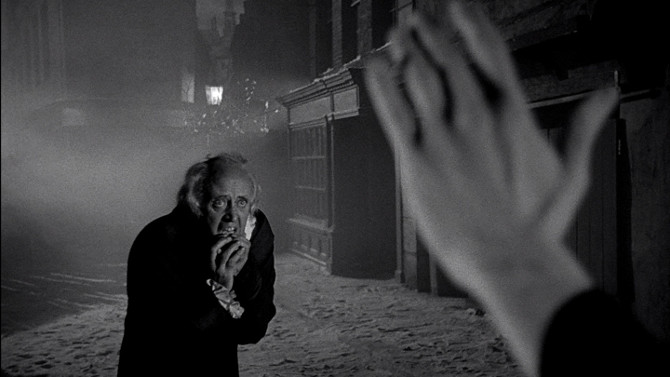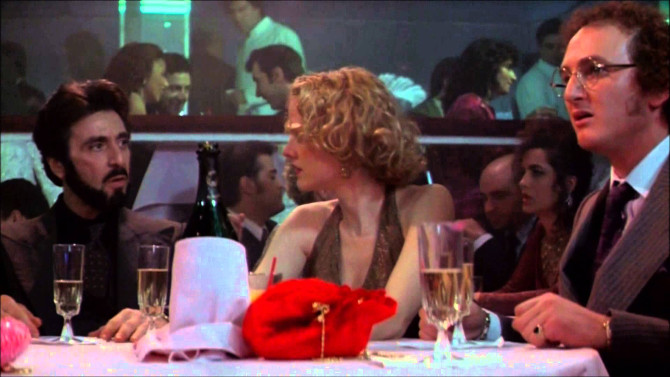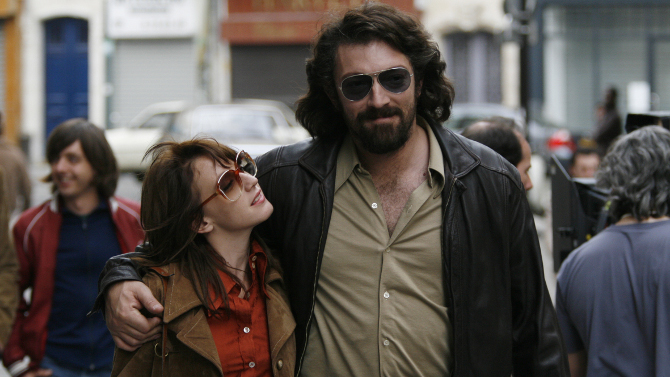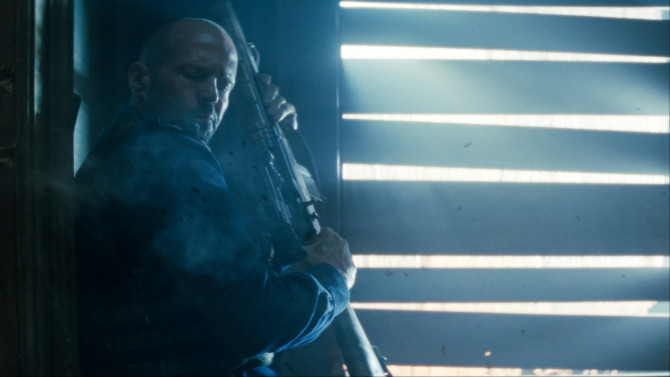
They Call Him the Working Man
Re-teaming together in short order after the success of 2024's The Beekeeper, director David Ayer and star Jason Statham return just one year later with A Working Man (2025)... if the former oozed an unbeatable action hero more along the lines of a John Wick, this newer effort clearly takes some inspiration from the Taken model of hustle and bustle. Actually taking its genesis from a 2014 Chuck Dixon novel entitled “Levon’s Trade”, it was Sylvester Stallone who snapped up its rights... originally adapting it for television through his Balboa Productions. Long story short, it was adjusted to become a movie, Stallone stepped away from starring in it (due to age constraints and a busy schedule with his series Tulsa King), with Ayer soon joining the production, making some additions to the script before directing.
-
Star Pick with Kim Campbell
 Here’s to Christmas SpiritsA Christmas CarolDecember 13, 2016
Here’s to Christmas SpiritsA Christmas CarolDecember 13, 2016A little while ago, I was fortunate enough to be able to interview The Right Honourable Kim Campbell, the 19th Prime Minister of Canada (and to date, the only female to land the top job), about her favourite film. Transporting me to ‘the most wonderful time of the year’, she illuminated me as to her Christmas program watching traditions. She explained that, each time December comes around, she makes time to gather round the television with her entire family and watch, back to back, The Muppet Christmas Carol starring Michael Caine, followed by the classic 1951 version of A Christmas Carol, with Alastair Sim taking on the legendary role of Ebenezer Scrooge. She lit up talking about her family custom, clearly cherishing the memories made by gathering the family to watch these two festive films. As I am only able to review one film as part of the Star Picks section, I will be looking at the 1951 incarnation of the Charles Dickens’ tale. Make sure to track down the Muppet version as well to get the full Prime Ministerial experience. Arguably the most iconic version of the miser, Alastair Sim has been etched in the collective psyche as the perfect Scrooge. With his receding hairline, bulbous eyes and curmudgeonly attitude, it is easy to buy him as a true hater of all things Christmas.
-
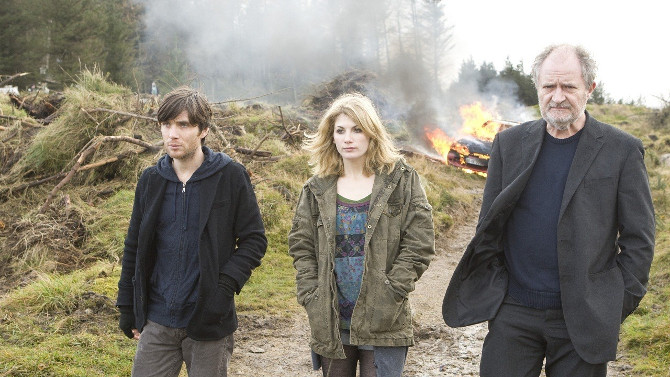
Perrier a Worthwhile Bounty for Audiences
Perrier's BountyDecember 11, 2016Narrated by the Grim Reaper (Gabriel Byrne), 2009's Perrier’s Bounty is an intriguing Irish film that mixes action and comedy within a crime story (all centred around a complex father/son relationship). Written by Mark O’Rowe (who also scribed the entertaining 2003 flick Intermission) and directed by Ian Fitzgibbon, they thrust us into the life of protagonist Michael McCrea (Cilian Murphy), a flawed, complicated figure who just happens to be sleeping in the afternoon while two thugs, Ivan (Michael McElhatton – Roose Bolton in Game of Thrones) and Orlando (Don Wycherley), sit on his couch eating his pistachios. Henchmen to a dangerous gangster, Darren Perrier (Brendan Gleeson), the duo remind the recently woken man that he owes the crime boss a hefty sum that must be paid in four short hours. Surrounded by an ever-complicated life, his female best friend Brenda (Jodie Whittaker), who lives one floor down, is struggling with her longtime boyfriend Shamie (Pádraic Delaney), while his father Jim (Jim Broadbent) arrives out of the blue and states that he is dying of cancer – the two have not spoken in some four years. Pushing them to the periphery while he deals with the more pressing problem of Perrier, he reaches out to a local drug dealer, Clifford (Domhnall Gleeson), as the man knows every low life in the city of Dublin. Getting directions to The Mull (Liam Cunningham – Davos Seaworth in Game of Thrones), a loan shark, he petitions him for some cash. Having none of it, instead, The Mull invites him to partake in a criminal venture with his buddy Dinny (Breffni McKenna), and Michael, desperate for any solution, agrees.
-
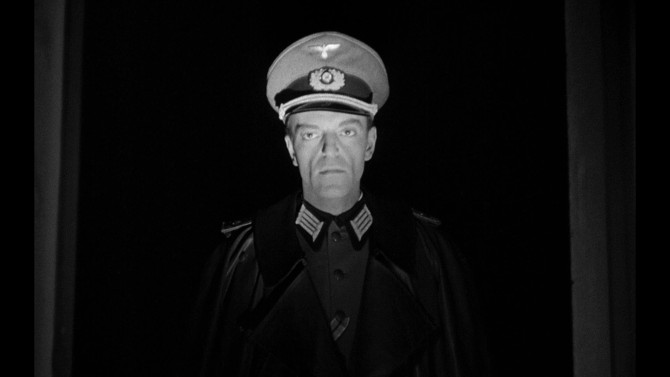
The Sound of Silence
Le Silence de la MerDecember 9, 2016Made with a surprisingly nuanced touch and a quiet grace by a first time filmmaker, Jean-Pierre Melville’s (Le Samouraï) 1949 drama Le Silence de la Mer is a philosophical study in how the lives of two individuals are affected when an occupying German soldier billets at their house, and, in turn, how living in their home changes him during World War II. Based upon Jean Bruller’s novel of the same name (which he published under the nom de plume Vercors), it became a symbol of resistance against the Nazi occupation of France (Melville himself was a part of the French Resistance, as was Bruller). As an interesting sidenote, Bruller discovered that Melville was planning on making the movie without the rights to his work. Meeting up with the filmmaker, he threatened to burn the negative if he did not like it, yet he allowed him to make the movie in his own home just outside of Paris. The pact was that Bruller would show his version to 24 former Resistance members and that they would have to unanimously give it their blessing (or Melville would burn the negative in front of the author). 23 of 24 voted in favour, the sole individual to go against the crowd did so not because he disagreed with the content of the film, but rather, how he found himself as part of the panel (as a last minute substitute – which offended him). Melville won out and Le Silence de la Mer became a huge hit in France.
-
Star Pick with Christian de la Cortina
 Show Me the WayCarlito's WayDecember 6, 2016
Show Me the WayCarlito's WayDecember 6, 2016Following the special screening of the Canadian independent film Generation Wolf at the historic Port Theatre in Cornwall, Ontario, I sat down with filmmaker Christian de la Cortina – who co-wrote, produced, directed and starred in the entertaining crime flick. Cortina, who works out of Quebec, has had a fruitful start to his career, dabbling in many French language television series and miniseries, including La Marraine, 19-2, Mon Ex à Moi and O’, as well as procuring roles in American productions being filmed in La Belle Province, including last year’s highly touted Academy Award nominee Brooklyn. 2008 was a watershed year for the man, as he released his first feature film – Transit, which he also produced, directed, wrote and starred in. Seeing it as an opportunity to concoct intriguing roles for himself and others (as he did not want to be placed in a position where he may only receive similar roles throughout his career – in other words, typecast), Generation Wolf can be seen as a successful extension of that plan – as it depicts an engaging story that is chock full of richly drawn characters.
-
Mais Oui, Crime Spree!
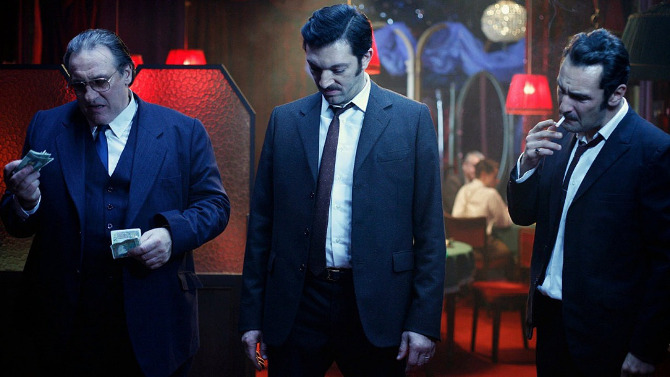 Mesrine Part 1: Killer InstinctMesrine Part 2: Public Enemy #1December 4, 2016
Mesrine Part 1: Killer InstinctMesrine Part 2: Public Enemy #1December 4, 2016A two part feature, Jean-François Richet’s action crime films Mesrine Part 1: Killer Instinct and Mesrine Part 2: Enemy #1 are best watched when paired together. That is why I am utilizing my dual review feature to discuss both here today. Together, running a little over four hours, the story looks at the life of real life figure Jacques Mesrine (Vincent Cassel) – brought to vivid life by the talented French actor, who is able to capture the man’s charm and Robin Hood (thief) appeal, as well as the scary side that bubbles just below the surface. From its very onset, we are drawn into the suspense-filled tale, as Richet utilizes a split screen effect (and sometimes more) to ratchet up the ominous foreboding. Resembling something from a Brian De Palma flick, it is an effective way to have us looking over our shoulder for some unknown threat. By the end of the sequence, we know the fate of our elusive figure and are transported back to learn the entire sordid tale. Part 1 spans the years 1959-1972.
-
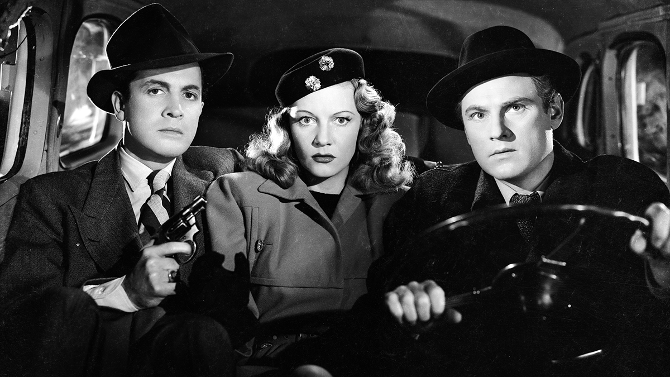
Confessions of a Fatal Femme
DecoyNovember 30, 2016Taking the rare angle of having the femme fatale be the voice-over narrator, the 1946 film noir Decoy, directed by Jack Bernhard, does a lot with the little budget it had. Perhaps the most brutal dame of them all, Margot Shelby (Jean Gillie) is shot at the very beginning of the story, wounded by a then unknown assailant. It is at this point that she recounts her sordid tale. Honey to a rough and tumble aging gangster, Frankie Olins (Robert Armstrong), the man has been placed behind bars following a robbery – which left a guard dead and the thief four hundred thousand dollars richer (which he hid before he got caught). Soon to be sent to the gas chamber, he still has hope that his girl, along with a gangster associate, Jim Vincent (Edward Norris), will find a way to help him escape his doomed fate. Vincent, already short tens of thousands in aiding his fellow hoodlum, is not eager to throw more dough his way.

